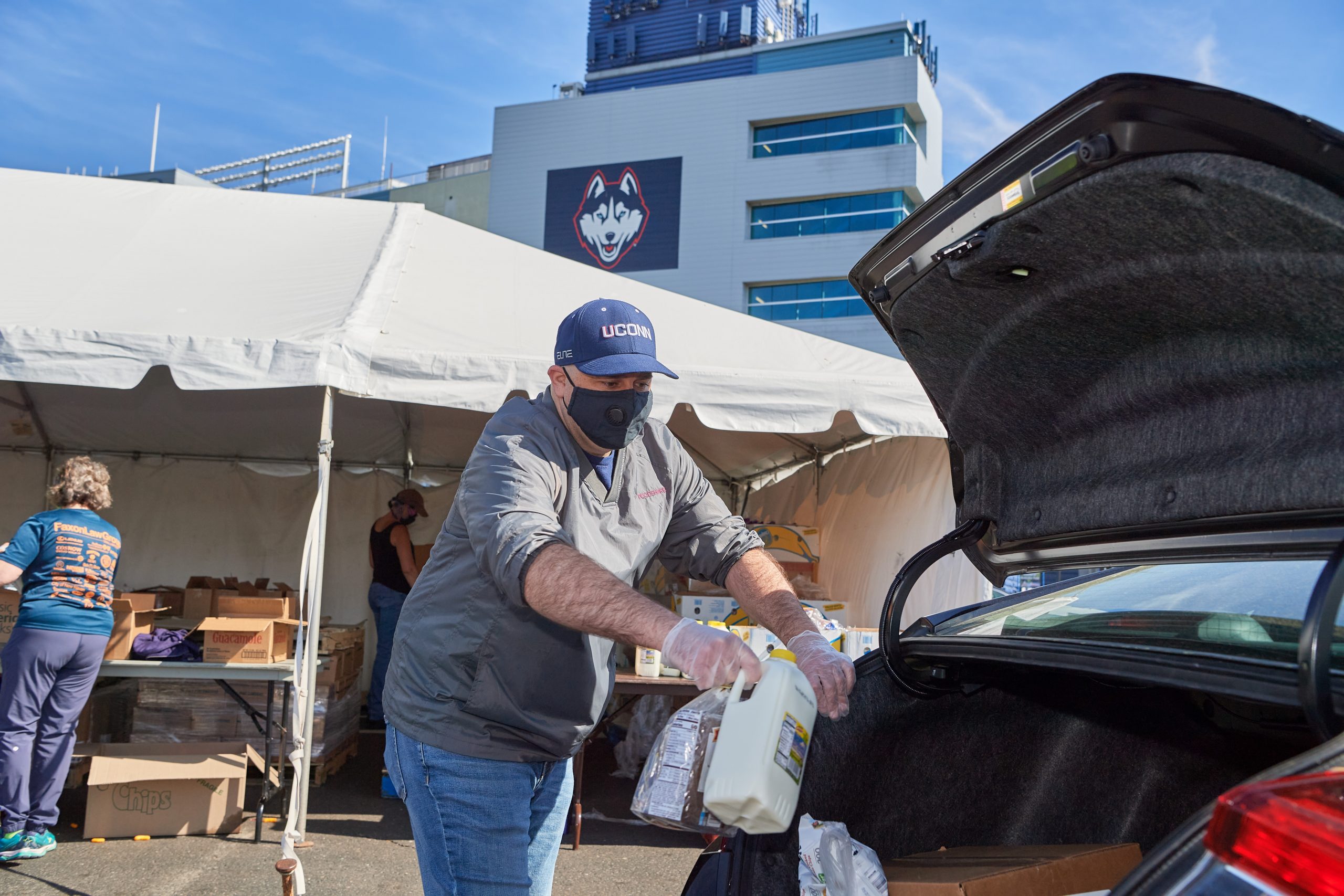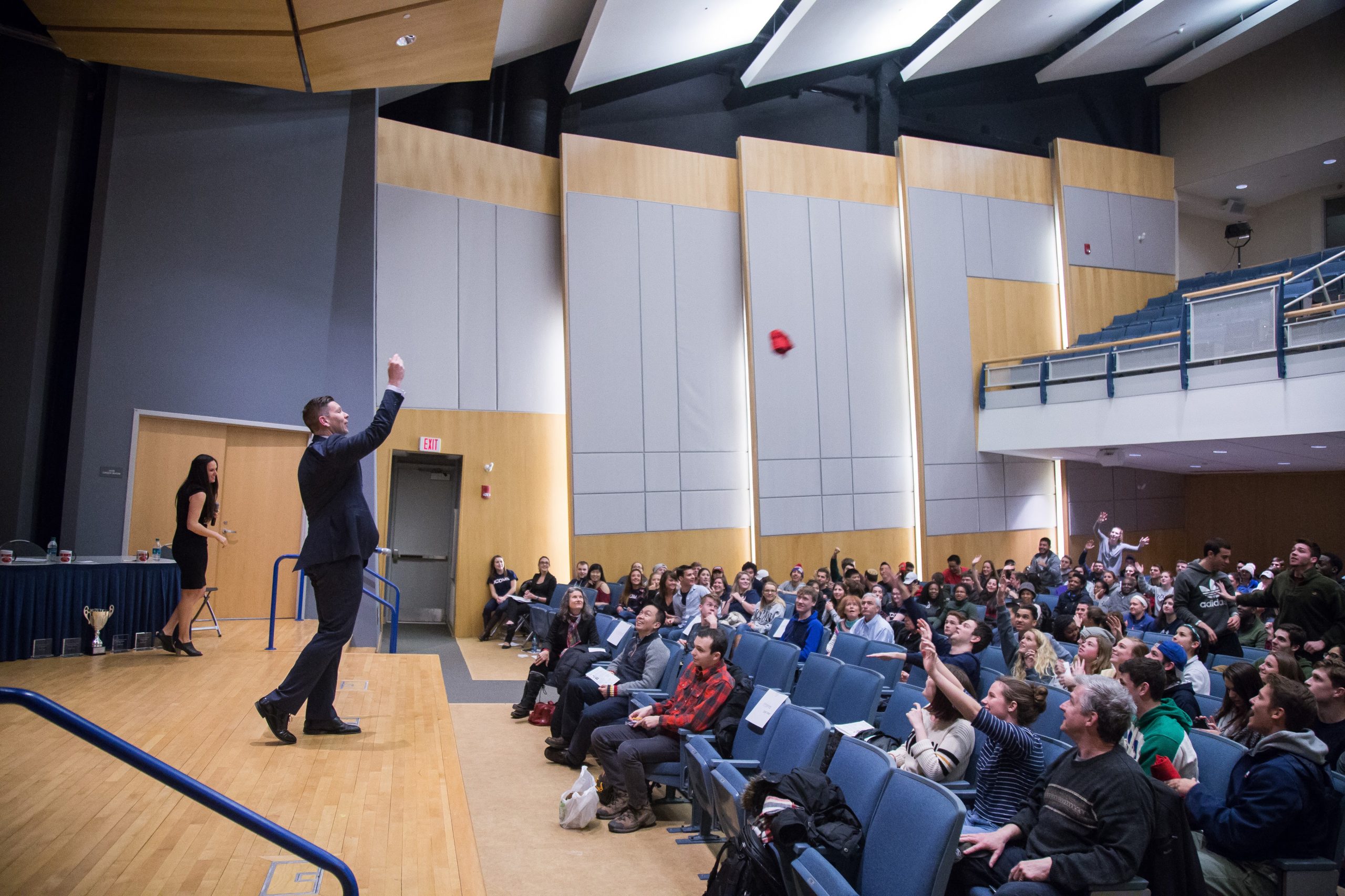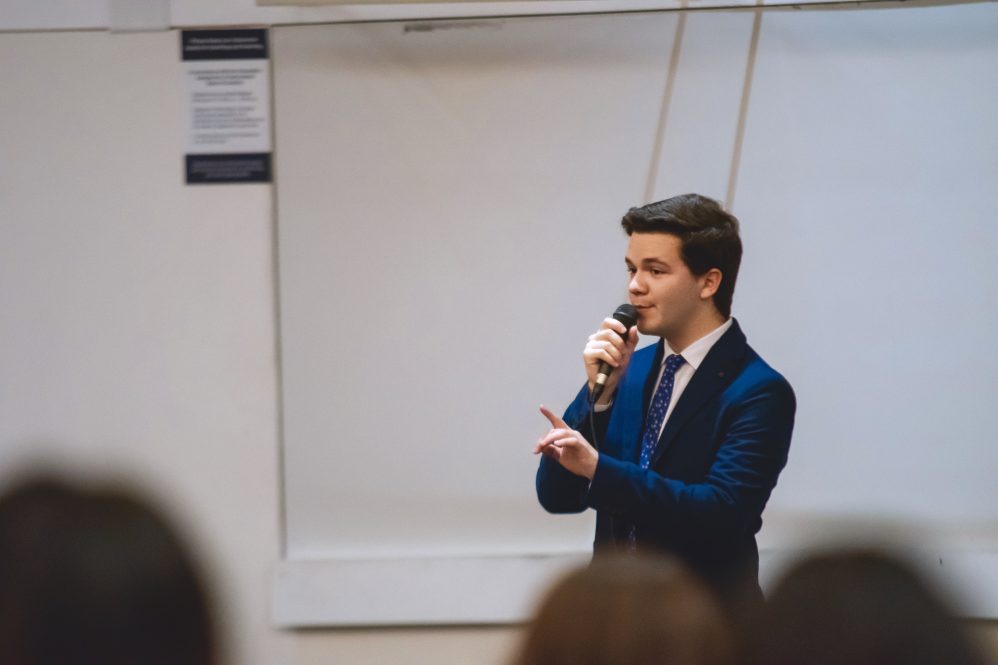In between virtual classes and homework, Olivia Swanson ’21 (CLAS) tries to make sure Connecticut’s local communities are well fed.
As an advocacy outreach intern at Foodshare, a regional food bank managed by Jason Jakubowski ’99 (CLAS), ’01 MPA, Swanson gets to put what she learns in her human rights classes to work first-hand.
Swanson and other CLAS students across the sciences, social sciences, and humanities are finding ways to take their academics out of the classroom through creative projects like playwriting, advocacy, and public speaking.
“I think a big part of it is thinking through how to create something that resonates with others,” Swanson says. “How do you take this topic that you care about and know to be important and get others to recognize this importance?”
Feeding the Hungry
As a human rights and natural resources dual degree student, Swanson found that exploring the issues involved in governing, producing, and accessing food perfectly combined her two majors.
She worked with Alyssa Webb, Educational Program Coordinator at the UConn Human Rights Institute, to find an internship that matched her interests in food banking.
“Classwork is heavy on reading and thinking about broad concepts,” Swanson says. “Doing an internship shows you different skills.”
At Foodshare, located in Bloomfield, Swanson drafts legislative forms and fact sheets, prepares presentations, and conducts research to support and advocate for nutritional programming at the food bank, which serves a community of over 119,000 people.
“It’s very internationally focused in the classroom, such as learning what the human rights practices are of an entire country, but human rights is a community-based field,” Swanson says.
However, her work at Foodshare is people-focused, she says, which gets her to think about how the concepts she learns in class apply to the real world and her Connecticut community.
“At the community level it might not seem like the concepts apply at first, because the language of human rights treaties is often disassociated from those immediately impacted, but [this internship] is about engaging with and learning about the community.”
One question she asks herself at work is: “How are we affecting people at this local level that actually means something?”
For instance, Swanson knows the importance of people having the right to food, which is included in the right to an adequate standard of living under the Universal Declaration of Human Rights.
But part of her internship involves advocating for policies that support that universal human right in communities like Hartford.
“I think this is one of the biggest lessons a human rights major can learn with experiences outside the classroom, and one I’ve gained through my internship experience,” she says. The work has led her to develop new skills, such as graphic design, as she developed materials educating the public on food assistance programs in Connecticut.
Swanson was recently accepted to work at AmeriCorps with multiple offers in positions that will enable her to work in food justice or community development.
“Human rights is such a broad topic, and so many things are fundamental human rights,” Swanson says.

Heavy is the Head
While applying for the University Scholars Program his junior year, Alexander Mika ’21 (CLAS), an English major, pitched a project combining a research paper and a play about how isolationism and ultranationalism can harm a state.
The unusual combination of a research paper and an original creative work, Mika says, allowed him to support his own argument factually, while also illustrating his and other points of view on the topic using art.
“In my proposal I had ultranationalism and jingoism and a Greek chorus in there at some point,” Mika says. “It was a huge mess that needed sorting, and I wasn’t sure where exactly I wanted to go with it. But then, in a frantic rabbit-hole search, I discovered the story of the Belgian king.”
King Badouin of Belgium, who reigned from 1951 to 1993, was suspended as King for one day in 1990 based on his personal beliefs about abortion.
Rather than signing into law a bill that would legalize the practice in Belgium, Badouin took the day off and the Prime Minister signed the bill in his stead. Badouin was reinstated as king the next day.
This was the foundation of Mika’s play, titled Heavy is the Head, Mika says. It details the story of a constitutional monarch whose country is about to enter a NATO-like alliance. The king is against this alliance, but he is legally required to sign any bill that comes to him.
Like King Badouin, Mika’s fictional king refuses to sign the bill out of principle, letting his ministry sign the bill and reinstate him later. But the king is still against the global alliance, and later works to prevent it. The play is mostly written as a tragedy.
Drawing on Shakespeare’s use of different rhetorical styles to indicate class, Mika uses blank verse to indicate characters with traditionalist, outdated views, like the king.
“In drama, almost no plays are written in verse now; it’s a fairly outdated way of writing,” Mika says. “I was hoping to signal in that way that the king is also outdated in these [isolationist] views.”
Early in the research for his play, Mika worked with Professor of English and Associate Dean Lyn Tribble on Shakespearean drama.
“Dr. Tribble was a great help in pointing me toward generative resources and showing me what the key elements of a Shakespearean play are and how to emulate them,” Mika says.
He also worked with Distinguished Professor of History Frank Costigliola to get a solid historical background. He had taken The Rise of U.S. Global Power with Costigliola his freshman year, and that sparked his interest in isolationism.
Now that he’s drafting the play, he’s working with English Associate Professor Ellen Litman and Professor Jean Marsden.
Mika hopes to stage a dramatic reading of the play after he graduates and the COVID-19 pandemic allows for gatherings.
“I’d love to have a performance of my play in the future,” he says.

UConn’s Best Public Speaker
As a graduate of a small liberal arts college, Rory McGloin ’11 Ph.D. became a professor at UConn with a mission to give students the type of out-of-classroom, meaningful experiences he’d had as an undergraduate.
“There was a need to bring the students together to give them an out-of-class experience that they could put to use in the real world,” says the associate professor of communication.
During a conversation in his office one day while teaching Comm 1100: Principles of Public Speaking, he says, a group of students from the Communication Society, which McGloin advised for eight years, suggested he coordinate a public speaking competition.
The following spring, after a trial-run in the fall, Rory and his team of dedicated undergraduates launched UConn’s First Public Speaking Competition, where students from all majors could audition to compete for the title of “UConn’s Best Public Speaker” and a scholarship prize.
The event was chaired by McGloin and produced by the UConn Communication Society, an undergraduate club affiliated with the Department of Communication.
This annual competition was one way for students to practice expressing a strong opinion or idea with evidence, in front of a live audience, building on the public speaking techniques they’d learned throughout their time as an undergraduate student.
“We wanted to showcase UConn’s top [public speaking] talent,” he says.
The event brought the top five public speakers together in a competition that included three rounds. In the first round, each student delivered a five-minute speech in answer to a common question, such as “What impact does social media have on our relationships?”
In the second round, contestants responded to a question about their first speech in two minutes, and in the third round they were given fifteen minutes to come up with a speech to an impromptu topic and deliver it in four minutes.
Students took responsibility for recruiting participants, booking the theater, setting the stage, handling ticket reservations, and promoting the event on social media.
Rory also coordinated alumni judges to participate in the event, giving the students a chance to meet with them and create career connections. For instance, in 2019, Ben Goldman ’18 (CLAS), a former student of McGloin’s and now an anchor at Fox 61, sat on the panel of judges.
“We were able to get some of our most distinguished alumni to come back and judge the competitions,” McGloin says.
McGloin also notes that this competition gave students an opportunity to showcase their speaking skills beyond the classroom. The competition provided a wide range of learning opportunities for students to showcase a breadth of communication skills, including student leadership, event planning, hospitality, and financing.
Former Communication Society President Brooke Hirsheimer ’15 (CLAS) worked on the event for all four years as an undergraduate, having an integral role in the competition’s growth.
Today, Hirsheimer serves as a Communications Specialist for the World Wildlife Fund, a position she would have described as her “dream job” many years ago when she was an undergraduate, McGloin says.
What’s valuable about a public speaking competition like this one, McGloin says, is that it promotes tremendous growth and confidence for the speakers. One students Steve Reilly ’17 (CLAS), was uncomfortable and didn’t always have the self-esteem to perform, McGloin says. Reilly placed in the third annual competition and helped coordinate the event the following year.
Reilly now works as a senior client service associate at Invesco, Ltd. In New York City.
“By the time he finished, he was just beaming with confidence,” says McGloin.
This is part of a series of articles highlighting the breadth of opportunities for experiential learning, research, one-on-one guidance, or mentorship between students and faculty in the College of Liberal Arts and Sciences. Explore more under the hashtag #DiscoverUConnCLAS.



